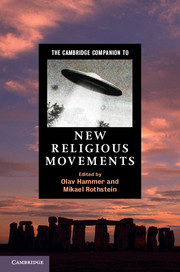Book contents
- Frontmatter
- Introduction to new religious movements
- Part I Social science perspectives
- 1 The sociology of new religious movements
- 2 New religious movements and the evolving Internet
- 3 Major controversies involving new religious movements
- Part II Themes
- Part III New religious movements
- Index
- Other titles in the series
1 - The sociology of new religious movements
from Part I - Social science perspectives
Published online by Cambridge University Press: 28 September 2012
- Frontmatter
- Introduction to new religious movements
- Part I Social science perspectives
- 1 The sociology of new religious movements
- 2 New religious movements and the evolving Internet
- 3 Major controversies involving new religious movements
- Part II Themes
- Part III New religious movements
- Index
- Other titles in the series
Summary
New Religions Studies (NRS), an emerging area of specialization in the academic study of religion, has as its primary mission the study of new religious movements (NRMs). While NRS has its roots in a variety of disciplines – anthropology, history, psychology, religious studies, and sociology – the discipline of sociology has played a particularly prominent role in its emergence and development. NRS arose in the context of the proliferation of countercultural movements during the 1960s and 1970s, and the initial orientation of area of study was heavily influenced by the cult controversy of that era. NRS has subsequently transcended this initial narrow focus and become an important area of theory and research on religious movements. The development of NRS benefited from a historic first, the existence of a group of scholars with sophisticated theoretical and methodological tools for studying the movements and a cohort of developing movements to study, a combination that had not existed for prior cohorts of NRMs.
The area of study that has become NRS has now been taking shape for nearly half a century, and a substantial corpus of scholarship on NRMs has been amassed. The emergence of NRS has made it possible to produce a steadily growing body of knowledge about how religious organizations form and grow. Scholars have been able to observe the basic components of religion – myth, ritual, conversion, leadership, and organization – while they are being constructed. As NRS has evolved, key issues for sociologists have included defining the area of study (NRMs) as well as distinguishing different types of NRMs; analyzing the patterning of conversion to new religious traditions; describing distinctive features of NRM myth and ritual, organization, and leadership; and exploring potential trends in NRM development. This chapter reviews the theory and research on these issues with the objective of identifying how this work has advanced our understanding of religious movements and, more generally, of religion.
- Type
- Chapter
- Information
- The Cambridge Companion to New Religious Movements , pp. 11 - 28Publisher: Cambridge University PressPrint publication year: 2012
- 5
- Cited by

